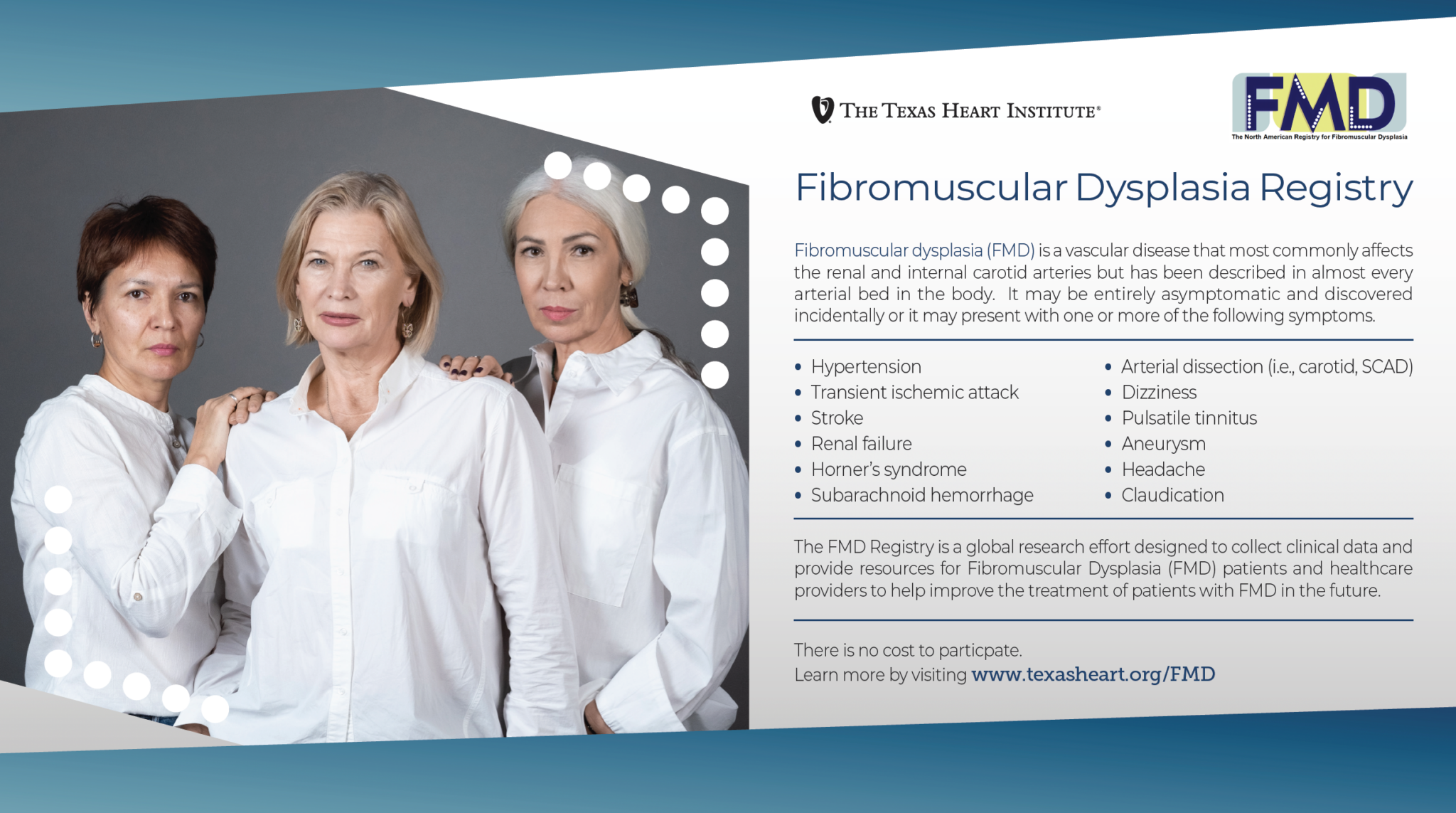The Texas Heart Institute Joins the North American Registry for Fibromuscular Dysplasia

Houston, Texas — July 18, 2023 — The Texas Heart Institute is proud to announce its official enrollment in the North American Registry for Fibromuscular Dysplasia (FMD Registry). The FMD Registry is a global research effort designed to collect clinical data and provide resources for FMD patients and healthcare providers.
FMD is a non-atherosclerotic, non-inflammatory disease that affects the walls of arteries throughout the body. It can lead to hypertension, aneurysms, dissections, and other complications. As the medical community works to understand and treat FMD, the FMD Registry provides a vital resource for patients and researchers alike.
The Texas Heart Institute’s participation in the FMD Registry underscores its long-standing commitment to advancing research and improving care for those affected by FMD. By participating in the registry, The Texas Heart Institute will be contributing to a global database of clinical information that can help inform treatment decisions and improve outcomes for FMD patients.
“We are proud to join the FMD Registry and contribute to this important research effort,” said Dr. Stephanie Coulter, Director of the Center for Women’s Heart & Vascular Health. “By sharing our data and experiences, we hope to make a real difference in the lives of those affected by FMD, which primarily affects women in the prime of their life.”
The most common clinical manifestations or “symptoms” of FMD include hypertension, a swooshing or whooshing sound that accompanies the heartbeat (pulsatile tinnitus), headache, and dizziness. A cerebrovascular event, including transient ischemic attack, stroke, and/or a temporary loss of vision in one or both eyes due to lack of blood flow to the retina (amaurosis fugax), occurs in one of every four patients and one in five patients experience an arterial dissection.
“Approximately 44% of the FMD patients have dissection or aneurysm, and this rate of prevalence has led the FMD Registry members to recommend that all patients with FMD have one-time, cross-sectional imaging from head to pelvis, whether or not they have symptoms, because early diagnosis may prevent the consequences of poorly controlled hypertension and allow for the identification of aneurysms and dissections and their appropriate treatment,” said Dr. Coulter.
The FMD Registry is a patient-driven initiative led by the Fibromuscular Dysplasia Society of America (FMDSA) and endorsed by the American Heart Association Council on Peripheral Vascular Disease. The registry collects both retrospective and prospective data on FMD patients, with the goal of improving understanding of the disease and advancing treatments.
“We welcome The Texas Heart Institute to the FMD Registry family,” said Dr. Jeffrey Olin, founder of the registry. “Their participation will help us build a more comprehensive picture of FMD from the ethnically diverse international community they serve and ultimately improve care for those affected by this complex disease.”
For more information on the FMD Registry and how to enroll, visit texasheart.org/fmd
About The Texas Heart Institute
The Texas Heart Institute is an independent, nonprofit organization that is improving cardiovascular health through trailblazing research, thought leadership, education, and patient care. Located within the Texas Medical Center in Houston, Texas, and founded in 1962 by renowned cardiac surgeon Dr. Denton Cooley, The Texas Heart Institute performed the first successful heart transplant and total artificial heart implant in the United States. Since then, our physicians and surgeons remain recognized as worldwide leaders in the diagnosis and treatment of even the most complex cardiovascular conditions. Research programs at The Texas Heart Institute continue to push the boundaries of cardiovascular science by translating laboratory discovery to patient care. The Texas Heart Institute has been ranked among the top cardiovascular centers in the United States by U.S. News & World Report for more than 30 years. www.texasheart.org
About the North American Registry for Fibromuscular Dysplasia
The North American Registry for Fibromuscular Dysplasia is sponsored by the FMD Society of America (www.fmdsa.org) and is coordinated by the University of Michigan Clinical Outcomes Research and Reporting Program (http://www.mcorrp.org/). The registry protocol is approved by the institutional review board of each participating clinical center. A standardized data collection form is completed at the time of initial enrollment for each participant, which includes demographics, presenting symptoms/signs, comorbidities, family history, medications, physical examination, imaging studies, vascular procedures, renal function, lipid profile, and history of vascular and clinical outcome events.





